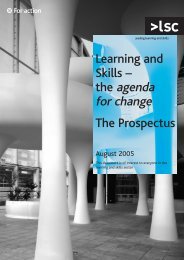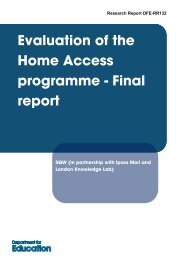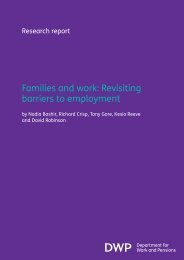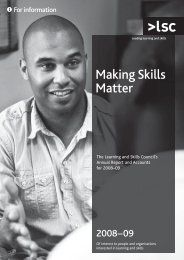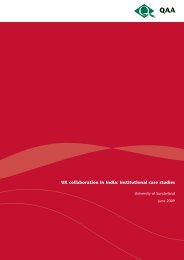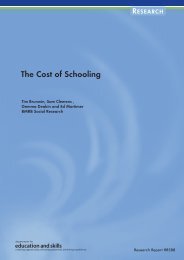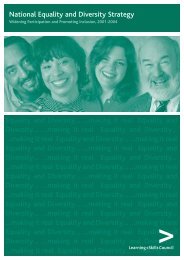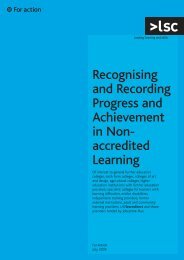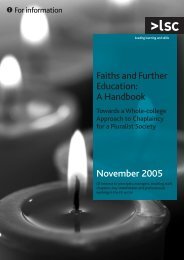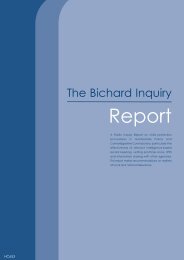Severn Business College - The Quality Assurance Agency for ...
Severn Business College - The Quality Assurance Agency for ...
Severn Business College - The Quality Assurance Agency for ...
Create successful ePaper yourself
Turn your PDF publications into a flip-book with our unique Google optimized e-Paper software.
<strong>Severn</strong> <strong>Business</strong> <strong>College</strong><br />
Review <strong>for</strong> Educational Oversight<br />
by the <strong>Quality</strong> <strong>Assurance</strong> <strong>Agency</strong><br />
<strong>for</strong> Higher Education<br />
November 2012
Review <strong>for</strong> Educational Oversight: <strong>Severn</strong> <strong>Business</strong> <strong>College</strong><br />
Key findings about <strong>Severn</strong> <strong>Business</strong> <strong>College</strong><br />
As a result of its Review <strong>for</strong> Educational Oversight carried out in November 2012, the QAA<br />
review team (the team) considers that there can be no confidence in how the provider<br />
manages its stated responsibilities <strong>for</strong> the standards of the awards it offers on behalf of the<br />
London Centre of Marketing (LCM) and the Association of <strong>Business</strong> Practitioners (ABP).<br />
<strong>The</strong> team also considers that there can be limited confidence in how the provider manages<br />
its stated responsibilities <strong>for</strong> the quality and enhancement of the learning opportunities it<br />
offers on behalf of these awarding organisations.<br />
<strong>The</strong> team considers that reliance can be placed on the accuracy and completeness of the<br />
in<strong>for</strong>mation that the provider is responsible <strong>for</strong> publishing about itself and the courses<br />
it delivers.<br />
Recommendations<br />
<strong>The</strong> team has also identified a number of recommendations <strong>for</strong> the enhancement of the<br />
higher education provision.<br />
<strong>The</strong> team considers that it is essential <strong>for</strong> the provider to:<br />
clarify the award and level of study that each student is registered on<br />
(paragraph 1.2)<br />
review its course planning processes at strategic and operational level<br />
(paragraph 1.3)<br />
ensure that students who were transferred from NCFE to LCM are able to complete<br />
their award (paragraph 1.4)<br />
review and develop its policies and procedures relating to annual monitoring to<br />
ensure they are effective and operationally fit <strong>for</strong> purpose (paragraph 1.6)<br />
implement action points specified by the awarding organisations within the specified<br />
deadline (paragraph 1.8)<br />
deliver appropriate and developmental examination preparation (paragraph 2.8).<br />
<strong>The</strong> team considers that it is advisable <strong>for</strong> the provider to:<br />
align its policies and procedures with the expectations of the Academic<br />
Infrastructure (paragraph 1.9)<br />
further develop the policy on internal verification to reflect the awarding<br />
organisations' requirements and promote transparency (paragraph 1.10)<br />
develop comprehensive course handbooks to detail how all the course units are to<br />
be delivered and assessed and the award achieved (paragraph 2.1)<br />
develop a policy on the regular peer observation of tutors by appropriately trained<br />
staff (paragraph 2.3)<br />
develop processes to enhance learning opportunities, <strong>for</strong> example, by utilising the<br />
results of annual monitoring, student surveys and other feedback (paragraph 2.4)<br />
review and improve academic induction <strong>for</strong> new students (paragraph 2.6)<br />
review and improve its use of candidate learning plans, in particular its approach to<br />
target setting and action monitoring (paragraph 2.7)<br />
develop a robust approach to staff development that includes staff appraisals<br />
(paragraph 2.9).<br />
1
Review <strong>for</strong> Educational Oversight: <strong>Severn</strong> <strong>Business</strong> <strong>College</strong><br />
<strong>The</strong> team considers that it would be desirable <strong>for</strong> the provider to:<br />
develop <strong>for</strong>mal mechanisms to provide student support (paragraph 2.5)<br />
further develop the virtual learning environment (paragraph 2.11)<br />
develop a policy on the publication and review of its public in<strong>for</strong>mation including<br />
input from students (paragraph 3.4)<br />
review claims made on its website so that they are properly contextualised<br />
(paragraph 3.5).<br />
2
Review <strong>for</strong> Educational Oversight: <strong>Severn</strong> <strong>Business</strong> <strong>College</strong><br />
About this report<br />
This report presents the findings of the Review <strong>for</strong> Educational Oversight 1 (REO) conducted<br />
by QAA at <strong>Severn</strong> <strong>Business</strong> <strong>College</strong> (the provider;the <strong>College</strong>). <strong>The</strong> purpose of the review is<br />
to provide public in<strong>for</strong>mation about how the provider discharges its stated responsibilities <strong>for</strong><br />
the management and delivery of academic standards and the quality of learning<br />
opportunities available to students. <strong>The</strong> review applies to courses of study that the provider<br />
delivers on behalf of the London Centre of Marketing (LCM), and the Association of<br />
<strong>Business</strong> Practitioners (ABP). <strong>The</strong> review was carried out by Mrs Heather Miller and<br />
Mr Brian Sullivan (reviewers) and Mr Alan Soutter (coordinator).<br />
<strong>The</strong> review team conducted the review in agreement with the provider and in accordance<br />
with the Review <strong>for</strong> Educational Oversight: Handbook. 2 Evidence in support of the review<br />
included a range of documentation supplied by the provider and its awarding organisations<br />
and meetings with staff and students.<br />
<strong>The</strong> review team also considered the provider's use of the relevant external reference points:<br />
syllabuses of the awarding organisations<br />
Academic Infrastructure<br />
Qualifications and Credit Framework<br />
Please note that if you are unfamiliar with any of the terms used in this report you can find<br />
them in the Glossary.<br />
<strong>The</strong> <strong>College</strong> was established in 2009 and was initially located in premises in Rom<strong>for</strong>d Road,<br />
Strat<strong>for</strong>d, London. In early 2012, due to the expiry of the lease on the Rom<strong>for</strong>d Road<br />
premises, the <strong>College</strong> relocated to 806 High Road, Leyton. <strong>The</strong> <strong>College</strong> comprises a number<br />
of rooms in a shared building and includes teaching rooms, an administrative office, an IT<br />
room with 14 workstations and a small library. Since its inception, the <strong>College</strong> has constantly<br />
changed its portfolio of courses in each year of operation. Its first intake was in May 2010<br />
offering courses awarded by the Institute of Commercial Management (ICM), NCFE and the<br />
Association of <strong>Business</strong> Practitioners (ABP). By 2011, the <strong>College</strong> ceased offering courses<br />
awarded by ICM due to poor student achievement (no students had achieved an award on<br />
the Level 5 Diploma in Marketing, Advertising and Public Relations only three out of an<br />
intake of 13 achieved the Level 6 award in Project Management). In 2012, the NCFE<br />
suspended the accreditation of its courses offered by the <strong>College</strong> until it was satisfied that<br />
the courses were fit <strong>for</strong> purpose and NCFE was satisfied that everything was in place to<br />
properly assess the candidates (see paragraph 1.3). As a result, the <strong>College</strong> ceased its<br />
relationship with NCFE and transferred the students to courses awarded by the London<br />
Centre of Marketing (LCM).<br />
At the time of the review, the provider offered the following higher education courses, listed<br />
beneath their awarding organisations:<br />
London Centre of Marketing<br />
Diploma in <strong>Business</strong> Management & Marketing (Level 5)<br />
Diploma in <strong>Business</strong> Management & Marketing (Level 6)<br />
Diploma in <strong>Business</strong> Management & Marketing (Integrated) Level 6<br />
1 www.qaa.ac.uk/InstitutionReports/types-of-review/tier-4.<br />
2 www.qaa.ac.uk/publications/in<strong>for</strong>mationandguidance/pages/reo-handbook.aspx.<br />
3
Review <strong>for</strong> Educational Oversight: <strong>Severn</strong> <strong>Business</strong> <strong>College</strong><br />
Association of <strong>Business</strong> Practitioners<br />
Extended Diploma in Marketing Management<br />
<strong>The</strong> provider's stated responsibilities<br />
<strong>The</strong> <strong>College</strong>'s responsibilities are set out in agreements with the awarding organisations.<br />
For the Association of <strong>Business</strong> Practitioners, the <strong>College</strong> is responsible <strong>for</strong> setting and first<br />
marking of assignments and the provision of feedback, student recruitment and quality<br />
assurance matters. For the London Centre of Marketing, the awarding organisation<br />
retains the responsibilities <strong>for</strong> curriculum development, setting and marking assignments.<br />
<strong>The</strong> <strong>College</strong> is responsible <strong>for</strong> matters including student recruitment, admissions, annual<br />
monitoring, progression, staff development and resources.<br />
Recent developments<br />
<strong>The</strong> <strong>College</strong> intends to increase recruitment from home and European Union (HEU)<br />
students. Although not part of the review, the <strong>College</strong> has recently ceased the teaching of<br />
English courses. <strong>The</strong>re<strong>for</strong>e, no courses will be offered in future with pre-sessional English.<br />
<strong>The</strong> <strong>College</strong> is intending to seek approval from Edexcel to award its courses.<br />
Students' contribution to the review<br />
Students studying on higher education courses at the provider were invited to present a<br />
submission to the review team. A student submission comprising a series of responses to a<br />
questionnaire issued by the <strong>College</strong> was submitted and a number of students met the review<br />
team and engaged in useful discussion.<br />
4
Review <strong>for</strong> Educational Oversight: <strong>Severn</strong> <strong>Business</strong> <strong>College</strong><br />
Detailed findings about <strong>Severn</strong> <strong>Business</strong> <strong>College</strong><br />
1 Academic standards<br />
How effectively does the provider fulfil its responsibilities <strong>for</strong> the management<br />
of academic standards<br />
1.1 <strong>The</strong> <strong>for</strong>mal structure <strong>for</strong> the management of academic standards is<br />
underdeveloped. <strong>The</strong> Principal and Registrar jointly share responsibility <strong>for</strong> academic<br />
standards with interchangeable roles in many areas as is common within a small<br />
organisation. <strong>The</strong> Principal and Registrar <strong>for</strong>m the Management Board which is responsible<br />
<strong>for</strong> the overall management of the <strong>College</strong>. <strong>The</strong>re is no underlying <strong>for</strong>mal committee<br />
structure. <strong>The</strong>re are frequent meetings of the Management Board but the minutes are brief<br />
and lack accountability <strong>for</strong> the <strong>for</strong>mal oversight of academic standards.<br />
1.2 <strong>The</strong> student record system does not effectively support the management of<br />
academic standards. <strong>The</strong> <strong>College</strong> In<strong>for</strong>mation Management System (CIMS) currently cannot<br />
generate management reports. Basic management in<strong>for</strong>mation including accurate student<br />
enrolment against courses, cohort size, and pass rates cannot be supplied in a clear reliable<br />
<strong>for</strong>mat. <strong>The</strong> <strong>College</strong> relies on manual registers which contain a wide range of data at<br />
individual student level. However, no coherent systematic method of data analysis at course<br />
or <strong>College</strong> level exists. For example, two students were on the current list of students<br />
despite one not attending from May 2012 and one student having been refused a visa.<br />
Originally, the students were recorded as being registered on the Level 6 Diploma in<br />
<strong>Business</strong> Management & Marketing (Integrated). Later, this was changed <strong>for</strong> most of the<br />
students to the Level 6 Diploma in <strong>Business</strong> Management & Marketing. It is essential that<br />
the <strong>College</strong> clarifies the award and level of study that each student is registered on.<br />
1.3 <strong>The</strong> planning of courses is short-term. <strong>The</strong> portfolio has constantly changed since<br />
the <strong>College</strong> commenced in 2009 with a range of different awards from four awarding<br />
organisations being offered. Course plans lack detail and clarity <strong>for</strong> the progression of<br />
students to achieve an award.<strong>The</strong>re are no curriculum plans <strong>for</strong> the delivery of a complete<br />
award. Decisions on the sequence of units are made <strong>for</strong> the following semester rather than<br />
<strong>for</strong> the duration of the award. <strong>The</strong>re is no detailed planning at cohort or individual student<br />
basis to ensure that an award can be achieved within the timescale. It is essential that the<br />
<strong>College</strong> reviews its course planning processes at strategic and operational level.<br />
1.4 <strong>The</strong> arrangements <strong>for</strong> the transfer of a group of students from one awarding<br />
organisation (NCFE) to another (LCM) mid-course was not properly managed.<br />
NCFE suspended the <strong>College</strong>'s customised courses and as a result the <strong>College</strong> decided to<br />
transfer all registered students to LCM courses. <strong>The</strong>re was no evidence of detailed planning<br />
by the management <strong>for</strong> the transfer of the students to the LCM qualification. It is unclear<br />
which LCM award the transferred students will achieve in the time available. <strong>The</strong> <strong>College</strong><br />
intends to offer additional free study to students beyond their registration period where visa<br />
requirements allow. It is essential that the <strong>College</strong> ensures that students transferred from<br />
NCFE to LCM are able to complete their award.<br />
1.5 <strong>The</strong> self-evaluation monitoring processes used by the <strong>College</strong> are in<strong>for</strong>mal and<br />
vague. <strong>The</strong> <strong>College</strong> states that monitoring is a primary quality assurance process and that<br />
courses and services are reviewed annually. <strong>The</strong> process of managing annual reviews,<br />
quality indicators or method of collecting in<strong>for</strong>mation is not detailed in the <strong>Quality</strong> <strong>Assurance</strong><br />
Handbook. An annual monitoring report template <strong>for</strong> courses has been created but it has not<br />
been systematically implemented. <strong>The</strong> process is owned by management and the<br />
contribution of staff and students is limited. Review of data is incomplete with no meaningful<br />
5
Review <strong>for</strong> Educational Oversight: <strong>Severn</strong> <strong>Business</strong> <strong>College</strong><br />
analysis of student or course per<strong>for</strong>mance. <strong>The</strong> team saw no evidence of any completed<br />
course reviews, action plans or monitoring of issues at course level.<br />
1.6 <strong>The</strong> <strong>for</strong>mal recording of issues relating to the management of academic standards<br />
is limited. An annual meeting is held by the Management Board to review all courses and<br />
services. <strong>The</strong> minutes of these meetings address areas of college-wide concern and issues<br />
of student resources. <strong>The</strong> actions arising lack rigour and the majority do not have a specific<br />
timeframe <strong>for</strong> implementation. It is essential that the <strong>College</strong> reviews and develops its<br />
policies and procedures relating to annual monitoring to ensure they are effective and<br />
operationally fit <strong>for</strong> purpose.<br />
1.7 <strong>The</strong> content and implementation of policies and procedures <strong>for</strong> the management of<br />
academic standards is imprecise and fragmented. In<strong>for</strong>mation is spread across the <strong>Quality</strong><br />
<strong>Assurance</strong> Manual, policy documents and student handbooks with limited cross-referencing.<br />
For example, the student appeals process is cumbersome and grounds <strong>for</strong> appeal including<br />
roles and responsibilities are poorly defined. <strong>The</strong> <strong>for</strong>ms necessary to undertake an appeal<br />
are not included in the student handbook. <strong>The</strong> academic misconduct policy is inconsistently<br />
implemented by staff and students who show little common understanding of its use.<br />
1.8 <strong>The</strong> <strong>College</strong>'s response to requests <strong>for</strong> implementation of action points from the<br />
awarding organisations lacks a sense of urgency. Following an external verifier re-approval<br />
visit from the Association of <strong>Business</strong> Practitioners (ABP), a series of action points were<br />
identified with a response due from the <strong>College</strong> by 31 July 2012. Following a reminder in<br />
September from the awarding organisation that failure to complete the action points could<br />
result in the withdrawal of ABP accreditation, the <strong>College</strong> sent a response at the end of<br />
October, the outcome of which is not yet known. Similarly, the NCFE (see paragraph 1.4)<br />
had communicated 14 action points in March 2012 <strong>for</strong> the continuation of the customised<br />
awards. <strong>The</strong> <strong>College</strong> did not respond until September 2012. It is essential that the <strong>College</strong><br />
implements action points specified by the awarding organisations within the specified<br />
deadline.<br />
How effectively are external reference points used in the management of<br />
academic standards<br />
1.9 <strong>The</strong>re is limited awareness of the Academic Infrastructure or the guidance available<br />
in the Code of practice <strong>for</strong> the assurance of academic quality and standards in higher<br />
education (the Code of practice). Policies and processes have not been mapped or<br />
referenced to the Code of practice. However, the <strong>College</strong> demonstrated awareness of the<br />
Qualifications and Credit Framework. It is advisable that the <strong>College</strong> aligns its policies and<br />
procedures with the expectations of the Academic Infrastructure.<br />
How does the provider use external moderation, verification or examining to<br />
assure academic standards<br />
1.10 <strong>The</strong> newly implemented policy on internal verification is lengthy and requires further<br />
development to provide clarity to ensure that it reflects the processes used by the <strong>College</strong>.<br />
Currently there is only one course requiring internal verification (Level 7 Extended Diploma<br />
in Marketing Management) <strong>for</strong> which the Registrar acts as internal verifier. Some progress<br />
has been made in implementing the internal verification processes but there was no<br />
evidence documenting corrective practices or scheduling of verification. It is advisable that<br />
the policy on internal verification be further developed to reflect the awarding organisations'<br />
requirements and promote transparency.<br />
6
Review <strong>for</strong> Educational Oversight: <strong>Severn</strong> <strong>Business</strong> <strong>College</strong><br />
<strong>The</strong> review team has no confidence in the provider's management of its responsibilities <strong>for</strong><br />
the standards of the awards it offers on behalf of its awarding organisations.<br />
2 <strong>Quality</strong> of learning opportunities<br />
How effectively does the provider fulfil its responsibilities <strong>for</strong> managing and<br />
enhancing the quality of learning opportunities<br />
2.1 <strong>The</strong> <strong>for</strong>mal structure <strong>for</strong> the management of learning opportunities is<br />
underdeveloped. While there is a <strong>College</strong> timetable and academic calendar there is no<br />
overall course delivery plan documented. Teaching staff translate awarding organisation<br />
syllabus and learning outcomes into a course planner/scheme of work. <strong>The</strong>se are<br />
week-by- week lists of learning outcomes to be delivered and are submitted to the Registrar<br />
<strong>for</strong> approval in advance of commencement of the unit. <strong>The</strong> Registrar undertakes an in<strong>for</strong>mal<br />
quality assurance review of courses delivery plans, but the team found no evidence of the<br />
<strong>for</strong>mal recording of this process. It is advisable that the <strong>College</strong> develops comprehensive<br />
course handbooks to detail how all the course units are to be delivered and assessed and<br />
the award achieved.<br />
How effectively are external reference points used in the management and<br />
enhancement of learning opportunities<br />
2.2 <strong>The</strong> use of external reference points is limited. <strong>The</strong> Qualification and Credit<br />
Framework (QCF) is the major external reference point. <strong>The</strong> <strong>College</strong> only offers<br />
qualifications that are QCF accredited. As stated in paragraph 1.9, the <strong>College</strong> has limited<br />
awareness of the Academic Infrastructure.<br />
How does the provider assure itself that the quality of teaching and learning is<br />
being maintained and enhanced<br />
2.3 Annual observations of tutors and teaching practices is undertaken with limited<br />
impact. <strong>The</strong> Registrar is responsible <strong>for</strong> this although he has not received any <strong>for</strong>mal training<br />
in observing. <strong>The</strong> observation is recorded on a detailed <strong>for</strong>m that highlights the criteria<br />
against which the observation is undertaken and includes the observer's comments in<br />
relation to lesson planning, presentation and student participation. It also highlights strengths<br />
and aspects to improve. <strong>The</strong>re is limited connection between observer findings and action<br />
taken. Recorded tutor actions do not reflect the aspects to improve identified by the<br />
observer. However, tutors are encouraged to reflect on their practice and to determine<br />
actions <strong>for</strong> improvement. It is advisable that a policy be developed on the regular peer<br />
observation of tutors by appropriately trained staff. Peer observation, however, takes place<br />
with positive outcomes, staff reporting that they had found it useful in identifying areas <strong>for</strong><br />
improving their lessons.<br />
2.4 <strong>The</strong> annual monitoring process is underdeveloped. <strong>The</strong> outcomes of teaching<br />
observation do not in<strong>for</strong>m annual monitoring reports or continuing professional development<br />
plans. <strong>The</strong>re is a termly student survey but few questions relate to teaching quality and<br />
student feedback is not utilised. Feedback from students regarding teaching and learning is<br />
limited. <strong>The</strong>re is no regular discussion between students and the <strong>College</strong>. <strong>The</strong> annual<br />
monitoring reports include a section that reviews per<strong>for</strong>mance in<strong>for</strong>mation but as yet this<br />
data has not been reviewed. It is advisable that the <strong>College</strong> develops processes to enhance<br />
learning opportunities, <strong>for</strong> example, by utilising the results of annual monitoring, student<br />
surveys and other feedback.<br />
7
Review <strong>for</strong> Educational Oversight: <strong>Severn</strong> <strong>Business</strong> <strong>College</strong><br />
How does the provider assure itself that students are supported effectively<br />
2.5 Student support processes are in<strong>for</strong>mal. <strong>The</strong> <strong>College</strong> does not have <strong>for</strong>mal<br />
mechanisms <strong>for</strong> support and there is no student welfare officer. Teaching staff provide<br />
limited in-class academic support. <strong>The</strong> Principal and Registrar supported by the<br />
Administrator have an open-door policy and offer a degree of pastoral support when<br />
approached by students. It is desirable that the <strong>College</strong> develop mechanisms to provide<br />
student support.<br />
2.6 Induction <strong>for</strong> new students is underdeveloped. <strong>The</strong> <strong>College</strong> provides, at the<br />
commencement of each cohort, a short induction meeting which includes health and safety<br />
arrangements, attendance, facilities and a limited introduction to the course. <strong>The</strong>re is no<br />
<strong>for</strong>mal academic induction and students are not offered study skills sessions. It is advisable<br />
that the <strong>College</strong> reviews and improves its academic induction <strong>for</strong> new students.<br />
2.7 Candidate learning plans are ineffectual. <strong>The</strong> Registrar completes the learning plan,<br />
listing the course and the units the student is going to undertake. A one-to-one meeting with<br />
each student takes place to review progress. This is in<strong>for</strong>med by attendance data and the<br />
input from teaching staff. Resultant actions are vague and do not include SMART targets.<br />
<strong>The</strong> students with whom the team met had little knowledge of the learning plans. It is<br />
advisable that the <strong>College</strong> reviews and improves its use of candidate learning plans,<br />
in particular its approach to target setting and action monitoring.<br />
2.8 <strong>The</strong>re is little structured examination preparation. While there are some sparing<br />
attempts at examination practice, this is not delivered or structured efficiently. <strong>The</strong> pass rate<br />
<strong>for</strong> examinations is low, evidenced by the cohort analysis undertaken by the team. While the<br />
<strong>College</strong> has recently recognised that it needs to take action in relation to weak student<br />
per<strong>for</strong>mance and has made contact with the relevant awarding organisations <strong>for</strong> feedback,<br />
immediate action is required by management to support student per<strong>for</strong>mance. It is essential<br />
that the <strong>College</strong> delivers appropriate and developmental examination preparation.<br />
What are the provider's arrangements <strong>for</strong> staff development to maintain and/or<br />
enhance the quality of learning opportunities<br />
2.9. Teaching staff are well qualified. <strong>The</strong>y hold master's degrees in relevant business<br />
or management disciplines. <strong>The</strong> <strong>College</strong> lacks a systematic approach to staff development.<br />
It does not have a staff development plan but has made recent attempts to upskill staff.<br />
<strong>The</strong> <strong>College</strong> has hosted two awarding organisations who delivered training events in relation<br />
to assessment practice. <strong>The</strong> Registrar is undertaking an internal verification qualification and<br />
one member of staff has completed PTLLS (Preparing to Teach in the Lifelong Learning<br />
Sector), another will undertake this qualification shortly. <strong>The</strong>re is no <strong>for</strong>mal system of staff<br />
appraisal. It is advisable that the <strong>College</strong> develops a robust approach to staff development<br />
that includes staff appraisals. Such a plan should be in<strong>for</strong>med by quality assurance<br />
processes including annual monitoring and teaching observation.<br />
How effectively does the provider ensure that learning resources are<br />
accessible to students and sufficient to enable them to achieve the learning<br />
outcomes<br />
2.10 Library resources are adequate although its usage is questionable. <strong>The</strong>re is a small<br />
library that holds a selection of relevant texts, including all the books recommended by the<br />
awarding organisation <strong>for</strong> the units delivered to date, although the students reported that<br />
they did not often use the texts. Students are also referred to the local public libraries as<br />
8
Review <strong>for</strong> Educational Oversight: <strong>Severn</strong> <strong>Business</strong> <strong>College</strong><br />
additional library resources but the <strong>College</strong> was not aware of whether relevant texts were<br />
actually available in those libraries.<br />
2.11 IT resources are sufficient <strong>for</strong> the number of current students with 14 internet-ready<br />
computers. <strong>The</strong> virtual learning environment site contains useful in<strong>for</strong>mation with lecture<br />
slides, lecture handouts, awarding organisation unit handbooks and the <strong>College</strong> policy on<br />
assessment. <strong>The</strong>re are links to awarding organisation websites, as well as other resource<br />
websites. <strong>The</strong> <strong>College</strong> plans to develop the site further. Students reported limited use of the<br />
virtual learning environment as the handouts from classes were emailed to them after<br />
lessons. It is desirable that the <strong>College</strong> further develops the virtual learning environment.<br />
<strong>The</strong> review team has limited confidence that the provider is fulfilling its responsibilities<br />
<strong>for</strong> managing and enhancing the quality of the intended learning opportunities it provides<br />
<strong>for</strong> students.<br />
3 Public in<strong>for</strong>mation<br />
How effectively does the provider's public in<strong>for</strong>mation communicate to<br />
students and other stakeholders about the higher education it provides<br />
3.1 For prospective students, the <strong>College</strong> is responsible <strong>for</strong> all of its public in<strong>for</strong>mation<br />
within the agreements with its awarding organisations. A prospectus, student handbook and<br />
limited course in<strong>for</strong>mation is produced but the <strong>College</strong> website is the main source of<br />
in<strong>for</strong>mation which is attractive and easy to negotiate. <strong>The</strong>re is detailed in<strong>for</strong>mation on<br />
admissions and course descriptors are closely based on awarding organisation websites.<br />
<strong>The</strong>re is no guidance on assessment <strong>for</strong> any course offered or on the implementation of the<br />
work placement element <strong>for</strong> the LCM Level 6 <strong>Business</strong> Management & Marketing<br />
(integrated).<br />
3.2 For enrolled students, the <strong>College</strong> communicates through a variety of media,<br />
including the virtual learning environment, individual student e-mail accounts, noticeboards<br />
and text messages.<br />
3.3 <strong>The</strong> in<strong>for</strong>mation on courses is not standardised and there<strong>for</strong>e inconsistent. Course<br />
and unit-specific handbooks are limited to the course syllabuses provided by the awarding<br />
organisations. This has not been contextualised to provide college-specific guidance on the<br />
delivery and assessment of the course. <strong>The</strong>re is a general student handbook used across all<br />
levels of courses which provides general <strong>College</strong> rules and regulations, policy and procedure<br />
in<strong>for</strong>mation.<br />
How effective are the provider's arrangements <strong>for</strong> assuring the accuracy and<br />
completeness of in<strong>for</strong>mation it has responsibility <strong>for</strong> publishing<br />
3.4 <strong>The</strong> <strong>College</strong> processes <strong>for</strong> publishing in<strong>for</strong>mation are largely effective although<br />
in<strong>for</strong>mal. <strong>The</strong> attractive website and the prospectus are the key sources of public in<strong>for</strong>mation<br />
and are well laid out and easy to navigate. Much of the in<strong>for</strong>mation published is taken<br />
directly from awarding organisation material. <strong>The</strong> Principal and Registrar take joint<br />
managerial responsibility <strong>for</strong> publication with administrative staff providing an additional<br />
accuracy check. In<strong>for</strong>mal reviews are undertaken on a regular basis by the management<br />
team. It is desirable that the <strong>College</strong> develops a policy on the publication and review of its<br />
public in<strong>for</strong>mation, including input from students.<br />
9
Review <strong>for</strong> Educational Oversight: <strong>Severn</strong> <strong>Business</strong> <strong>College</strong><br />
3.5 Some <strong>College</strong> claims on the website are insufficiently contextualised and may,<br />
hence, be misleading to prospective students. For example, the <strong>College</strong> omits to indicate<br />
that it is one of the top 500 emerging business schools and not the top 500 business<br />
schools. It is desirable that the <strong>College</strong> reviews claims made on its website so that they are<br />
properly contextualised.<br />
<strong>The</strong> team concludes that reliance can be placed on the accuracy and completeness of<br />
the in<strong>for</strong>mation that the provider is responsible <strong>for</strong> publishing about itself and the courses<br />
it delivers.<br />
10
Review <strong>for</strong> Educational Oversight: <strong>Severn</strong> <strong>Business</strong> <strong>College</strong><br />
Action plan<br />
<strong>The</strong> provider was required to develop an action plan to follow up on good practice and<br />
address recommendations arising from the review. However, an action plan was not<br />
complete at the time of publishing and the report is there<strong>for</strong>e published without one.<br />
11
Review <strong>for</strong> Educational Oversight: <strong>Severn</strong> <strong>Business</strong> <strong>College</strong><br />
About QAA<br />
QAA is the <strong>Quality</strong> <strong>Assurance</strong> <strong>Agency</strong> <strong>for</strong> Higher Education. QAA's mission is to safeguard<br />
standards and improve the quality of UK higher education.<br />
QAA's aims are to:<br />
meet students' needs and be valued by them<br />
safeguard standards in an increasingly diverse UK and international context<br />
drive improvements in UK higher education<br />
improve public understanding of higher education standards and quality.<br />
QAA conducts reviews of higher education institutions and publishes reports on the findings.<br />
QAA also publishes a range of guidance documents to help safeguard standards and<br />
improve quality.<br />
More in<strong>for</strong>mation about the work of QAA is available at: www.qaa.ac.uk.<br />
More detail about Review <strong>for</strong> Educational Oversight can be found at:<br />
www.qaa.ac.uk/institutionreports/types-of-review/tier-4.<br />
12
Review <strong>for</strong> Educational Oversight: <strong>Severn</strong> <strong>Business</strong> <strong>College</strong><br />
Glossary<br />
This glossary explains terms used in this report. You can find a fuller glossary at:<br />
www.qaa.ac.uk/aboutus/glossary. Formal definitions of key terms can be found in the<br />
Review <strong>for</strong> Educational Oversight: Handbook 3<br />
Academic Infrastructure Guidance developed and agreed by the higher education<br />
community and published by QAA, which is used by institutions to ensure that their courses<br />
meet national expectations <strong>for</strong> academic standards and that students have access to a<br />
suitable environment <strong>for</strong> learning (academic quality). It consists of four groups of reference<br />
points: the frameworks <strong>for</strong> higher education qualifications, the subject benchmark<br />
statements, the course specifications and the Code of practice. Work is underway<br />
(2011-12) to revise the Academic Infrastructure as the UK <strong>Quality</strong> Code <strong>for</strong> Higher<br />
Education.<br />
academic quality A comprehensive term referring to how, and how well, institutions<br />
manage teaching and learning opportunities to help students progress and succeed.<br />
academic standards <strong>The</strong> standards set and maintained by institutions <strong>for</strong> their courses and<br />
expected <strong>for</strong> their awards. See also threshold academic standard.<br />
awarding body A body with the authority to award academic qualifications located on the<br />
framework <strong>for</strong> higher education qualifications, such as diplomas or degrees.<br />
awarding organisation An organisation with the authority to award academic qualifications<br />
located on the Qualifications and Credit Framework <strong>for</strong> England and Northern Ireland (these<br />
qualifications are at levels 1 to 8, with levels 4 and above being classed as 'higher<br />
education').<br />
Code of practice <strong>The</strong> Code of practice <strong>for</strong> the assurance of academic quality and standards<br />
in higher education, published by QAA: a set of interrelated documents giving guidance <strong>for</strong><br />
higher education institutions.<br />
designated body An organisation that has been <strong>for</strong>mally appointed to per<strong>for</strong>m a particular<br />
function.<br />
differentiated judgements In a Review <strong>for</strong> Educational Oversight, separate judgements<br />
respectively <strong>for</strong> the provision validated by separate awarding organisations.<br />
enhancement Taking deliberate steps at institutional level to improve the quality of learning<br />
opportunities. It is used as a technical term in QAA's audit and review processes.<br />
feature of good practice A positive aspect of the way a higher education institution<br />
manages quality and standards, which may be seen as exemplary to others.<br />
framework A published <strong>for</strong>mal structure. See also framework <strong>for</strong> higher education<br />
qualifications.<br />
framework <strong>for</strong> higher education qualifications A published <strong>for</strong>mal structure that identifies<br />
a hierarchy of national qualification levels and describes the general achievement expected<br />
of holders of the main qualification types at each level, thus assisting higher education<br />
providers in maintaining academic standards. QAA publishes the following frameworks: <strong>The</strong><br />
3 www.qaa.ac.uk/publications/in<strong>for</strong>mationandguidance/pages/reo-handbook.aspx.<br />
13
Review <strong>for</strong> Educational Oversight: <strong>Severn</strong> <strong>Business</strong> <strong>College</strong><br />
framework <strong>for</strong> higher education qualifications in England, Wales and Northern Ireland<br />
(FHEQ) and<br />
<strong>The</strong> framework <strong>for</strong> qualifications of higher education institutions in Scotland.<br />
highly trusted sponsor An education provider that the UK government trusts to admit<br />
migrant students from overseas, according to Tier 4 of the UK Border <strong>Agency</strong>'s points-based<br />
immigration system. Higher education providers wishing to obtain this status must undergo a<br />
successful review by QAA.<br />
learning opportunities <strong>The</strong> provision made <strong>for</strong> students' learning, including planned<br />
courses of study, teaching, assessment, academic and personal support, resources (such<br />
as libraries and in<strong>for</strong>mation systems, laboratories or studios) and staff development.<br />
learning outcome What a learner is expected to know, understand and/or be able to<br />
demonstrate after completing a process of learning.<br />
operational definition A <strong>for</strong>mal definition of a term, which establishes exactly what QAA<br />
means when using it in reports.<br />
course (of study) An approved course of study which provides a coherent learning<br />
experience and normally leads to a qualification.<br />
course specifications Published statements about the intended learning outcomes of<br />
courses of study, containing in<strong>for</strong>mation about teaching and learning methods, support and<br />
assessment methods, and how individual units relate to levels of achievement.<br />
provider An institution that offers courses of higher education, typically on behalf of a<br />
separate awarding body or organisation. In the context of REO, the term means an<br />
independent <strong>College</strong>.<br />
public in<strong>for</strong>mation In<strong>for</strong>mation that is freely available to the public (sometimes referred to<br />
as being 'in the public domain').<br />
reference points Statements and other publications that establish criteria against which<br />
per<strong>for</strong>mance can be measured. Internal reference points may be used by providers <strong>for</strong><br />
purposes of self-regulation; external ones are used and accepted throughout the higher<br />
education community <strong>for</strong> the checking of standards and quality.<br />
quality See academic quality.<br />
subject benchmark statement A published statement that sets out what knowledge,<br />
understanding, abilities and skills are expected of those graduating in each of the main<br />
subject areas (mostly applying to bachelor's degrees), and explains what gives that<br />
particular discipline its coherence and identity.<br />
threshold academic standard <strong>The</strong> minimum standard that a student should reach in order<br />
to gain a particular qualification or award, as set out in the subject benchmark statements<br />
and national qualifications frameworks. Threshold standards are distinct from the standards<br />
of per<strong>for</strong>mance that students need to achieve in order to gain any particular class of award,<br />
<strong>for</strong> example a first-class bachelor's degree. See also academic standard.<br />
widening participation Increasing the involvement in higher education of people from a<br />
wider range of backgrounds.<br />
14
RG 1154 04/12<br />
<strong>The</strong> <strong>Quality</strong> <strong>Assurance</strong> <strong>Agency</strong> <strong>for</strong> Higher Education<br />
Southgate House<br />
Southgate Street<br />
Gloucester<br />
GL1 1UB<br />
Tel 01452 557000<br />
Fax 01452 557070<br />
Email comms@qaa.ac.uk<br />
Web www.qaa.ac.uk<br />
© <strong>The</strong> <strong>Quality</strong> <strong>Assurance</strong> <strong>Agency</strong> <strong>for</strong> Higher Education 2012<br />
ISBN 978 1 84979 849 5<br />
All QAA's publications are available on our website www.qaa.ac.uk<br />
Registered charity numbers 1062746 and SC037786



